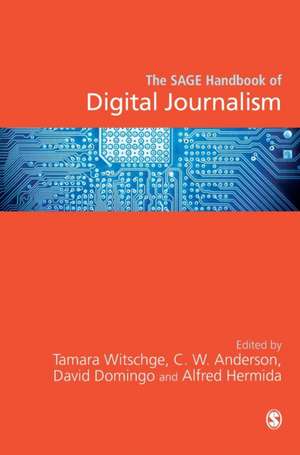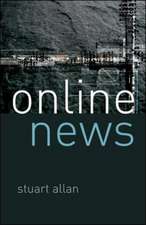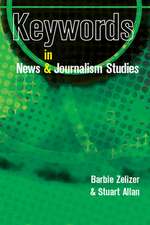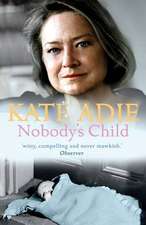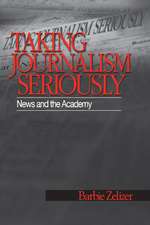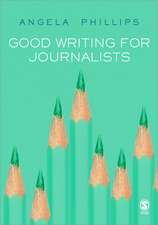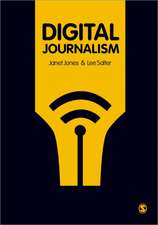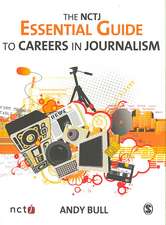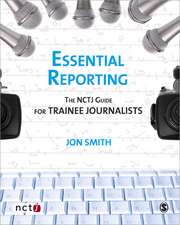The SAGE Handbook of Digital Journalism
Editat de Tamara Witschge, Chris W. Anderson, David Domingo, Alfred Hermidaen Limba Engleză Hardback – 31 mai 2016
Section A: Changing Contexts
Section B: News Practices in the Digital Era
Section C: Conceptualizations of Journalism
Section D: Research Strategies
By addressing both institutional and non-institutional news production and providing ample attention to the question ‘who is a journalist?’ and the changing practices of news audiences in the digital era, this Handbook shapes the field and defines the roadmap for the research challenges that scholars will face in the coming decades.
Preț: 1120.48 lei
Preț vechi: 1534.90 lei
-27% Nou
Puncte Express: 1681
Preț estimativ în valută:
214.40€ • 224.45$ • 177.40£
214.40€ • 224.45$ • 177.40£
Carte tipărită la comandă
Livrare economică 05-19 aprilie
Preluare comenzi: 021 569.72.76
Specificații
ISBN-13: 9781473906532
ISBN-10: 1473906539
Pagini: 624
Dimensiuni: 184 x 246 x 38 mm
Greutate: 1.27 kg
Ediția:1
Editura: SAGE Publications
Colecția Sage Publications Ltd
Locul publicării:London, United Kingdom
ISBN-10: 1473906539
Pagini: 624
Dimensiuni: 184 x 246 x 38 mm
Greutate: 1.27 kg
Ediția:1
Editura: SAGE Publications
Colecția Sage Publications Ltd
Locul publicării:London, United Kingdom
Recenzii
Just like the news and newswork, journalism studies comes in increasingly varied forms and formats. Rather than trying to tame this tiger, the editors of this truly impressive Handbook succeed in setting scholars free - offering a glimpse of the many trees rather than focusing on the forest. The field will be so much better for it.
Here is a really useful book that helps us make sense of digital journalism in flux – how technology is disrupting the economy of traditional journalism, changing what ‘doing journalism’ means, redefining who gets to speak and listen, and yet leaving some things unchanged, all set within a wider conceptual framework that takes account of comparative difference and past theorising.
This gloriously eclectic compendium embraces the “messiness” of the digital world while celebrating the diverse and continually evolving nature of journalism within it. The superb group of leading journalism studies scholars assembled here raise enough intriguing issues to keep our intellects happily engaged for a long time to come.
This ambitious reference project enlists an international cast of academics for substantive entries (with bibliographies) on the protean issues posed by digital journalism. This reviewer found it interesting that the volume begins with politics, moves through changing business models to questions of practice and ethics, and concludes with a section on research strategies (the most important section is on big data analysis). Underlying themes include the chip on the shoulder that bloggers always wear when comparing themselves with the "elite" or "mainstream" media and the overblown claims for "citizen witnesses" and the supposed gains in "transparency" that digital brings.
Here is a really useful book that helps us make sense of digital journalism in flux – how technology is disrupting the economy of traditional journalism, changing what ‘doing journalism’ means, redefining who gets to speak and listen, and yet leaving some things unchanged, all set within a wider conceptual framework that takes account of comparative difference and past theorising.
This gloriously eclectic compendium embraces the “messiness” of the digital world while celebrating the diverse and continually evolving nature of journalism within it. The superb group of leading journalism studies scholars assembled here raise enough intriguing issues to keep our intellects happily engaged for a long time to come.
This ambitious reference project enlists an international cast of academics for substantive entries (with bibliographies) on the protean issues posed by digital journalism. This reviewer found it interesting that the volume begins with politics, moves through changing business models to questions of practice and ethics, and concludes with a section on research strategies (the most important section is on big data analysis). Underlying themes include the chip on the shoulder that bloggers always wear when comparing themselves with the "elite" or "mainstream" media and the overblown claims for "citizen witnesses" and the supposed gains in "transparency" that digital brings.
Cuprins
Introduction - Editors
PART I: CHANGING CONTEXTS
1. Digital Journalism and Democracy - Beate Ursula Josephi
2. Global Media Power - Owen Taylor
3. Digital News Media and Ethnic Minorities - Eugenia Siapera
4. The Business of News - Rasmus Kleis Nielsen
5. Digital Journalism Ethics - Stephen J.A. Ward
6. Social Media and the News - Alfred Hermida
7. Networked Framing and Gatekeeping - Sharon Meraz & Zizi Papacharissi
8. The Intimization of Journalism - Steen Steensen
9. Emotion and Journalism - Karin Wahl-Jorgensen
PART II: NEWS PRACTICES IN THE DIGITAL ERA
10. Networked Journalism - Adrienne Russell
11. Hybrid News Practices - James F. Hamilton
12. The Ecology of Participation - Renee Barnes
13. Innovation in the Newsroom - Steve Paulussen
14. Outsourcing Newswork - Henrik Örnebring & Raul Ferrer
15. Semi-professional Amateurs - Jérémie Nicey
16. Sources as News Producers - Matt Carlson
17. Activists as News Producers - Yana Breindl
18. Citizen Witnesses - Stuart Allan
19. Hyperlocal News - Andy Williams & David Harte
PART III: CONCEPTUALIZATIONS OF JOURNALISM
20. Normative Models of Digital Journalism - Daniel Kreiss & J.S. Brennen
21. Mass, Audience, and the Public - Laura Ahva & Heikki Heikkilä
22. Digital Journalism as Practice - Bart Cammaerts & Nick Couldry
23. Mapping the Human-Machine Divide in Journalism - Seth C. Lewis & Oscar Westlund
24. Spaces and Places of News Consumption - Chris Peters
25. News Institutions - David M. Ryfe
26. Journalistic Fields - Tim P. Vos
27. News Networks - David Domingo & Victor Wiard
28. News Ecosystems - C.W. Anderson
29. Liquid Journalism - Anu Kantola
PART IV: RESEARCH STRATEGIES
30. Ethnography of Digital News Production - Sue Robinson & Meredith Metzler
31. Adopting a 'material sensibility' in journalism studies - Juliette De Maeyer
32. Reconstructing production practices through interviewing - Zvi Reich & Aviv Barnoy
33. Sampling Liquid Journalism - Anders Olof Larsson, Helle Sjøvaag, Michael Karlsson, Eirik Stavelin & Hallvard Moe
34. Big Data Analysis - Axel Bruns
35. Q-Method and News Audience Research - Kim Christian Schrøder
36. Practicing audience-centred journalism research - Irene Costera Meijer
37. Multi-method Approaches - Wiebke Loosen & Jan-Hinrik Schmidt
PART I: CHANGING CONTEXTS
1. Digital Journalism and Democracy - Beate Ursula Josephi
2. Global Media Power - Owen Taylor
3. Digital News Media and Ethnic Minorities - Eugenia Siapera
4. The Business of News - Rasmus Kleis Nielsen
5. Digital Journalism Ethics - Stephen J.A. Ward
6. Social Media and the News - Alfred Hermida
7. Networked Framing and Gatekeeping - Sharon Meraz & Zizi Papacharissi
8. The Intimization of Journalism - Steen Steensen
9. Emotion and Journalism - Karin Wahl-Jorgensen
PART II: NEWS PRACTICES IN THE DIGITAL ERA
10. Networked Journalism - Adrienne Russell
11. Hybrid News Practices - James F. Hamilton
12. The Ecology of Participation - Renee Barnes
13. Innovation in the Newsroom - Steve Paulussen
14. Outsourcing Newswork - Henrik Örnebring & Raul Ferrer
15. Semi-professional Amateurs - Jérémie Nicey
16. Sources as News Producers - Matt Carlson
17. Activists as News Producers - Yana Breindl
18. Citizen Witnesses - Stuart Allan
19. Hyperlocal News - Andy Williams & David Harte
PART III: CONCEPTUALIZATIONS OF JOURNALISM
20. Normative Models of Digital Journalism - Daniel Kreiss & J.S. Brennen
21. Mass, Audience, and the Public - Laura Ahva & Heikki Heikkilä
22. Digital Journalism as Practice - Bart Cammaerts & Nick Couldry
23. Mapping the Human-Machine Divide in Journalism - Seth C. Lewis & Oscar Westlund
24. Spaces and Places of News Consumption - Chris Peters
25. News Institutions - David M. Ryfe
26. Journalistic Fields - Tim P. Vos
27. News Networks - David Domingo & Victor Wiard
28. News Ecosystems - C.W. Anderson
29. Liquid Journalism - Anu Kantola
PART IV: RESEARCH STRATEGIES
30. Ethnography of Digital News Production - Sue Robinson & Meredith Metzler
31. Adopting a 'material sensibility' in journalism studies - Juliette De Maeyer
32. Reconstructing production practices through interviewing - Zvi Reich & Aviv Barnoy
33. Sampling Liquid Journalism - Anders Olof Larsson, Helle Sjøvaag, Michael Karlsson, Eirik Stavelin & Hallvard Moe
34. Big Data Analysis - Axel Bruns
35. Q-Method and News Audience Research - Kim Christian Schrøder
36. Practicing audience-centred journalism research - Irene Costera Meijer
37. Multi-method Approaches - Wiebke Loosen & Jan-Hinrik Schmidt
Descriere
A cutting edge and critical exploration of the intersection between journalism and our rapidly evolving digital communication technologies.
